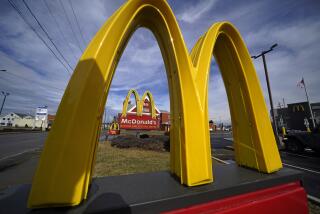Burger King promises to use cage-free eggs and pork
- Share via
Burger King Corp.promised Wednesday to switch to only cage-free eggs and pork -- a day after the reemergence of mad-cow disease focused national scrutiny even more on Americans’ food sources.
The fast food giant, one of the largest in the world, said it would phase out cages for its chickens and gestation crates for breeding pigs by 2017 – making its pledge among the most sweeping of many such vows made recently by competitors such as McDonald’s and Wendy’s.
Changes in animal welfare practices have swept the food service and supply industries in recent months, as undercover investigations by animal rights activists and concessions from major companies created a domino effect.
Burger King said its decision, which also includes provisions to only buy pork from suppliers who also plan to phase out gestation crates, was backed by the Humane Society of the United States. The chain, which operates thousands of restaurants, said it was among the first quick-serve restaurants to implement humane sourcing policies, with efforts to incorporate cage-free eggs and pork starting in 2007.
McDonald’s Corp. said in February that it would begin to weed gestation crates – cramped stalls used to house pregnant sows – out of its system. Suppliers such as Cargill, Hormel and Smithfield Farms have also started phase-outs of the containers.
States such as Florida and California have laws that prohibit the use of too-small crates for meat and egg-producing animals.
On Tuesday, many of the same animal rights groups that have agitated for changes in pig- and chicken-raising practices used the discovery of bovine spongiform encephalopathy in a California cow as a platform to reiterate their stances.
“With their chronic lack of oversight, inadequate veterinary care for animals and routine overuse of antibiotics, America’s factory farms have become a breeding ground for disease and a serious public health menace,” said Nathan Runkle, executive director of Mercy For Animals, in a statement.
California cows “are typically kept confined to hard, abrasive concrete or manure-laden dirt,” said PETA spokesman David Perle. “They commonly suffer from udder infections, painfully swollen knees, ulcers, hoof disorders such as food rot and abscesses that can result in lameness and premature death.”
Even though USDA officials and beef industry representatives have stressed that the human food chains are safe and not at risk, Runkle urged a vegetarian diet to help avoid “the many deadly threats posed by meat consumption.”
“After all, there is no such thing as mad tofu disease,” he said.
RELATED:
Spam maker Hormel to treat its pigs better
McDonald’s wants better treatment for pregnant pigs
McDonald’s pork provider Smithfield pledges gestation crate phase-out
Follow Tiffany Hsu on Twitter and Google+
More to Read
Inside the business of entertainment
The Wide Shot brings you news, analysis and insights on everything from streaming wars to production — and what it all means for the future.
You may occasionally receive promotional content from the Los Angeles Times.











